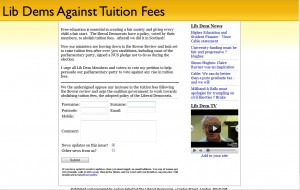 Did GMB’s & Unite’s rule-stretching endorsements of Ed Miliband tip the balance in Ed’s favour?
Did GMB’s & Unite’s rule-stretching endorsements of Ed Miliband tip the balance in Ed’s favour?
Jim Pickard at the FT reports that Unite included a leaflet supporting Ed Miliband in its ballot mailing to members and that at least some envelopes had Ed’s picture on them.
The Guardian reports that the GMB went further, mailing out ballot envelopes within larger envelopes featuring Ed Miliband’s picture. The paper quotes Mark Wickham-Jones, Professor of Politics at Bristol University as commenting, “The GMB appear to have broken the spirit of the rules guiding the conduct of the Labour party leadership.” Labour party and union figures have rejected such suggestions.
More prescient is Prof. Wickham-Jones’ observation that,”In the event of an Ed Miliband victory …… It may well suggest that the margin of his victory depended on votes cast in dubious circumstances.”
So, whether the rules were broken or not, the question is: Did these actions by GMB and Unite deliver a majority for Ed?
The only sure way to know would be to be to compare the votes of GMB & Unite if there had been no Ed Miliband endorsement in the ballot mailing with the vote results where the endorsement was present. Since the former never happened we cannot do this.
Using detail from the the leadership results published by Labour, we can try to work backwards and see if these Union “ballot endorsements” got Ed his majority. This can be done by comparing the voting patterns of GMB and Unite with those of other affiliated unions.
Overall Ed’s majority was 1.3% over David Miliband. This is equivalent to 2,596 of the 199,671 Affiliate Member votes that the Milibands had between them after the 4th and final round of AV transfers.
Labour only provide breakdowns of the first preference votes by each affiliated organisation. We need to see if the Unite and GMB “ballot endorsements” inflated Ed’s vote above the “norm”. My best guess at a “norm” is to take the mean vote for Ed across all affiliated unions. This is 35.51%.
GMB and Unite did indeed return an above-average vote for Ed: 42.05% and 42.62% respectively; 6.55% and 7.13% above the mean. Only the UCATT union had a higher first preference vote for Ed Miliband at almost 60%.
If this higher voter than the union average is exclusively due to the “ballot ensdorsements”, then this tactic delivered an extra 10,750 votes for Ed Miliband, almost four times his eventual majority.
Of course the higher GMB and Unite votes could be just due to extra underlying support for Ed from the voters in these unions . However, I find it hard to believe that such a blatant endorsement on the actual outer envelope containing the ballot did not influence some voters.
Even if this tactic was only responsible for a quarter of the above average first preference votes returned by the GMB and Unite, then it is still greater than Ed Miliband’s eventual majority.
The lack of data on the transfers means that I can’t analyse how the tactic affected the lower preferences of Alan Millburn, Diane Abbott and Ed Balls. However, I believe it must have had some positive effect on Ed Miliband’s vote. And this strengthens my point further.
Why would two of the biggest Labour-affiliated unions spend thousands on this promotional strategy if it didn’t influence their members when they received their ballots?
And finally, if the GMB and Unite have delivered the Labour leadership to Ed Miliband, what will they want in return?
 Space Shuttle Discovery is due to launch from Florida on Wednesday 3rd November at 3.52pm EDT (7.52pm GMT if I’ve got my time zones right).
Space Shuttle Discovery is due to launch from Florida on Wednesday 3rd November at 3.52pm EDT (7.52pm GMT if I’ve got my time zones right).

